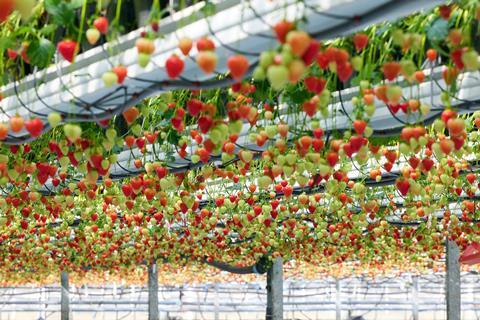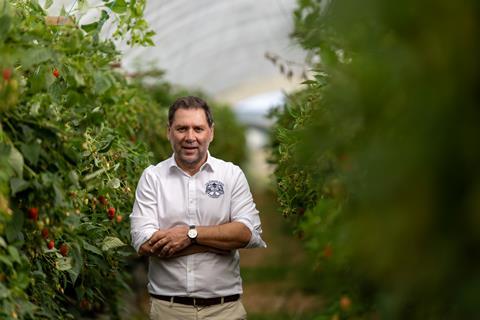David Sanclement, CEO of The Summer Berry Company, explains why he sees opportunities to expand 52-week UK production, particularly in strawberries

There has been a decline in UK self-sufficiency in glasshouse vegetables such as cucumbers in the past few years. But how much scope do you see to boost the UK’s year-round self-sufficiency in berries?
According to data from British Berry Growers, penetration and fruit sales are on the rise every year. This, combined with the increased quality of locally grown fruit, should enable UK growers to produce more year-round – like we do in strawberries – however the financial incentives need to improve.
In which crops do you think we are most likely to see further investment in year-round greenhouse production in the UK?
Currently, strawberries are the soft fruit on the shelves in the greatest volume during the winter period. With positive feedback from our customers, we believe year-round strawberries have a strong growth opportunity.
What would you like to see the government do to support more out-of-season production in Britain?
We would like to see a strategy about the UK’s food production and security that is supported by a long-term investment proposal. The current process of opening grant funding at short notice and with a short application period does not make long-term investment planning easy. We would like clarity on the future role of producer organisations in the UK, along with a well-thought-through broader policy on green energy and land utilisation in the UK.
How much harder is it to grow crops for the full 12 months, with no gaps in the supply calendar?
Providing 12-month supply comes with its challenges. It requires us to use new and different growing techniques to manage the less favourable weather conditions for the plants, and proactive planning to ensure fruits are produced according to schedule.

Is there enough of a financial incentive for suppliers and retailers to invest in expensive year-round British production rather than continuing to import from overseas in the off-season?
Producing year-round in the UK provides food security to UK consumers and a stable supply for producers, which in turn will increase efficiency. It also significantly reduces food miles and the associated carbon footprint. The financial incentives could be better targeted and confirmed before funding application windows so that suppliers can include these in their long-term planning.
Aside from improving food security, what are the other advantages of out-of-season greenhouse production?
Along with benefits like the GDP raise, a key benefit is the reduction of food miles due to locally grown crops being sourced in a more sustainable way. In addition, providing 12 months of work, instead of purely seasonal contracts, helps growers secure and nurture talent.
To what extent do shoppers care about eating British produce all year round?
Consumers associate British produce with consistency, high standards and assured quality. We often sense disappointment from consumers, and a drop in sales, when the season finishes and lower quality imports start.
Consumers are more conscious than ever about shopping sustainably, reducing road/air miles, and cutting the carbon footprint of their shopping. Buying British is a great way to do this. Also, consumers care about buying local, supporting British farmers, and supporting the British economy.
We have received a lot of positive feedback from our retail partners, and directly from consumers, about our off-season production. And we’re experiencing very strong demand, which signifies that consumers do care.
What lessons can the UK learn from other countries with a more advanced greenhouse sector, such as The Netherlands and Belgium?
Generally speaking, the countries mentioned above have developed their greenhouse production further than the UK. We are actively benchmarking with numerous growers and research centres in the Netherlands and Belgium to build on our knowledge. This includes the management of how the crops are grown, as well as our understanding of the new technologies that can be used.



